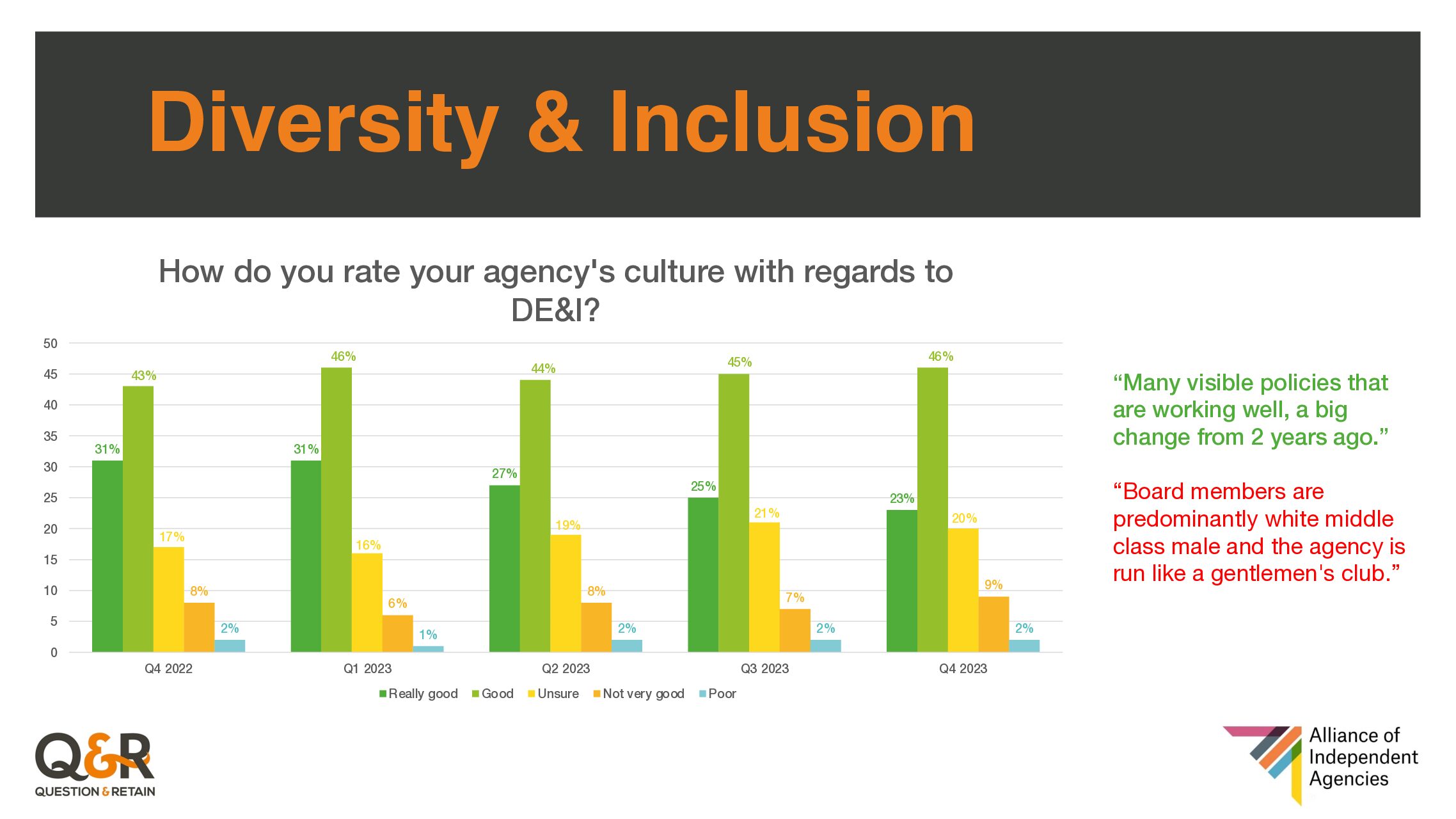The significance of diversity and inclusion (D&I) in the modern workplace cannot be overstated, not only for the moral and ethical imperatives they represent but also for the tangible benefits they bring to organisations. As society becomes increasingly aware of the importance of representing a multitude of voices and experiences, corporate procurement processes are evolving. Now, when appointing agencies through the tendering process, there is a growing emphasis on these agencies demonstrating their commitment to diversity and inclusion. This shift is not merely a trend but a reflection of a deeper understanding of how diverse perspectives drive innovation, creativity, and resilience in business.
We have been tracking how well agency staff rate their agency on their approach to D&I via our long-established *People Pulse that runs in conjunction with The Alliance of Independent Agencies. We collate both quantitative and qualitative data gathered from over 950 agency staff every quarter. The figures certainly tell a story that there is work to be done, but the anonymised comments are the gold dust:
“Board members are predominantly white middle-class males and the agency is run like a gentlemen’s club.”

The Business Case for Diversity and Inclusion
At its core, diversity encompasses a wide range of human differences, including but not limited to race, gender, ethnicity, neurodiversity, age, sexual orientation, disability, and religion. On the other hand, inclusion is the practice of ensuring that all individuals within an organisation feel valued and respected and have access to the same opportunities. Together, diversity and inclusion create an environment where the unique contributions of all employees are honoured and leveraged for business success.
Research consistently shows that diverse and inclusive companies are more likely to outperform their less diverse counterparts. A report by McKinsey & Company, for example, found that companies in the top quartile for gender diversity on executive teams were 25% more likely to have above-average profitability than companies in the fourth quartile. Similarly, for ethnic and cultural diversity, top-quartile companies were 36% more likely to achieve higher profitability. These findings underscore the fact that diversity isn’t just a metric to aspire to; it’s a key ingredient in the recipe for corporate success.
Diversity and Inclusion in Corporate Procurement
The procurement process is a critical area where the commitment to diversity and inclusion can be clearly demonstrated. When appointing agencies, organisations are increasingly evaluating potential partners not only based on
Refdcxvw fv cost and capability but also on their diversity and inclusion policies and practices. This shift reflects a broader understanding that working with diverse suppliers and agencies can enhance creativity, offer fresh perspectives, and foster innovation.
Corporate procurement departments are now asking tough questions:
- Does the agency employ a diverse workforce?
- Do they have inclusive hiring practices?
- How do they support minority-owned businesses?
Answers to these questions are becoming decisive factors in the tendering process. This is because partnering with agencies that prioritise diversity and inclusion aligns with corporate values and supports broader social objectives, such as reducing economic disparities and promoting social justice.
The Benefits of Diverse Agencies
Agencies that champion diversity and inclusion bring a multitude of benefits to their clients. They are better positioned to understand and connect with diverse audiences, a critical factor in today’s global marketplace. Their varied perspectives can lead to more creative and innovative solutions, avoiding the echo chamber effect that can stifle creativity. Moreover, such agencies are often more adaptable and resilient, as their inclusive cultures are geared toward embracing change and leveraging diverse viewpoints to navigate challenges.
Implementing Diversity and Inclusion in the Tendering Process
To effectively integrate diversity and inclusion criteria into the procurement process, organisations can take several steps. First, they can establish clear diversity and inclusion goals and communicate these objectives as part of their request for proposal (RFP) criteria. This might include asking agencies to provide evidence of their diversity and inclusion initiatives, workforce demographics, and case studies demonstrating how diversity and inclusion have been leveraged in their work.
Second, organisations can use scorecards to assess and compare agencies on their diversity and inclusion efforts, ensuring that these factors are given weight alongside traditional criteria such as cost and strategic fit. Additionally, organisations can seek to partner with diversity and inclusion certification bodies, which can provide a benchmark for assessing agencies’ commitments to these principles.
Challenges and Considerations
While the emphasis on diversity and inclusion in agency selection is commendable, it is not without its challenges. One potential issue is the risk of tokenism, where efforts to be diverse are superficial rather than substantive. To combat this, organisations must look beyond mere numbers and statistics and evaluate the depth of an agency’s commitment to creating a genuinely inclusive culture.
Furthermore, the pursuit of diversity and inclusion must be balanced with other procurement criteria. While these principles are increasingly important, they should complement, not replace, considerations of cost, quality, and capability. Finding the right balance requires a nuanced approach that recognises the multifaceted value that diverse and inclusive agencies can bring to the table.
Conclusion
The growing emphasis on diversity and inclusion in the corporate procurement process is a positive development that reflects broader societal changes. As organisations increasingly recognise the value of diverse perspectives and inclusive cultures, they are seeking partners who share these values. By prioritising diversity and inclusion in the tendering process, companies can drive social change, foster innovation, and achieve better business outcomes. In this evolving landscape, agencies that demonstrate a genuine commitment to diversity and inclusion will not only stand out in the procurement process but will also be better positioned for success in the diverse and dynamic markets they serve.
*The People Pulse is a short 12-question survey run by Q&R every quarter to better understand the thoughts and feelings among the UK’s independent agency sector.
The data shown in the graphic is based on Q4 2023 in which 862 respondents from 41 agencies shared their views. If you would like to find out more please contact us at tellmemore@questionandretain.co.uk or call 07790 216 441.
